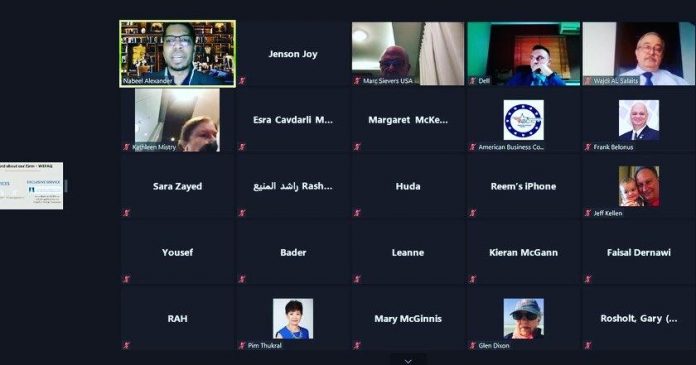ABCK-AmCham Kuwait hosted a Tax Seminar for U.S. Citizens Overseas in collaboration with Wefaq Consultancy Group by Dr. Nabeel Alexander, Consultant for Wefaq Consultancy Group. The virtual seminar was organized with the support of other GCC AmChams: AmCham Qatar, AmCham Bahrain, AmCham Oman, and AmCham Saudi Arabia.
The seminar started off with opening remarks by Mr. Frank Belonus, the Chairman of ABCK-AmCham Kuwait, as he welcomed the participants and introduced Dr. Alexander.
Dr. Alexander thanked the attendees for their interest in the topic and started the Tax discussion letting participants know that any U.S. Person must file for taxes to the IRS, and he explained what a “U.S. Person is”. A U.S. Person includes Green Card holders, people who are born in the U.S., people who own significant business interest, stocks, or rental properties in the U.S.
He classified the tax return by the IRS in three categories- Single U.S. persons below the age of 65, Single U.S. persons above 65 and Couples below 65. He explained that the minimum annual income for a single filer is $12,400 per year, and for U.S. persons who are above 65, the annual income is $14,050 per year. For couples, it is double the amount of a single U.S. person i.e. $24,800. He added that married couples who file jointly, have their information appear in one tax return, and he urged married couples to file for taxes jointly, as this will bring benefits to them on their tax return.
Dr. Alexander also reminded participants that tax filing deadlines are upcoming. He explained that tax returns should be submitted by April 15. U.S. Citizens overseas automatically receive an extension if they lived outside of the U.S. for over a year, their deadline is in June. In addition, he said that the deadline this year was moved to May 17 inside of the U.S. due to COVID, but the international deadline remains the same for this year.
He also covered means to file taxes, he said, “most people domestically in the U.S. will use a software, which are programs that involve a few different ways that it is set up to ask questions and walk you through the process.”. However, U.S. persons remain responsible for any mistakes done during filing tax return, so it is best to consult with tax experts, as they often provide and insurance clause in the case that there are mistakes done during the tax filing.
Dr. Alexander also mentioned that in 2010, the U.S. Congress passed a bill called the Foreign Account Tax Compliance Act which increases scrutiny on U.S. persons overseas. He noted that the IRS requires any bank abroad to report to them any U.S. Persons’ accounts that hold over $10,000.
U.S. Persons are advised to report their earnings and accounts in order to avoid penalties. Dr. Alexander provided an example for Kuwait, in which if a U.S. person has over KWD 3000 for 10 years, the U.S. Treasury Department can charge penalties of up to $10,000 per year in which that account held this amount. He also reminded participants that for if a U.S. Person had multiple accounts, the penalty would go to each one of them separately. Nevertheless, Dr. Alexander warned that if the IRS believes the U.S. person has not filed their taxes as an intentional, the penalty can go up to $100,000 per year or 50 % of the maximum amount in the account.
He also noted that banks in the region with a branch in the U.S. identify violators to the IRS, as the bank itself can be fined 30% of its assets in the U.S.
Moreover, in 2015 the U.S. Congress added to this by not allowing U.S. citizens to renew their passport if they owe over $50,000. Nevertheless, Dr. Alexander mentioned that U.S. persons who did not pay taxes overseas for years, should utilize the Offshore Voluntary Disclosure Program, which requires payment of six years of tax returns and 8 years of FBAR, regardless of how many years a U.S. person has not filed their taxes. He also reminded U.S. persons to file for taxes even if they fall under the tax exemption bracket, to avoid any penalties from the IRS.
He concluded his talk by discussing the Stimulus checks that were provided during the COVID 19 period of 2020 and 2021. He added that U.S. persons are eligible to receive these if they fall within the appropriate economic brackets. He noted that to get a Stimulus check, U.S persons must file their tax returns for both 2019 and 2018 to receive their stimulus check, as this amount can be increased based on that U.S. persons’ number of dependents with a U.S. Social Security Number. He advised participants to use the U.S. Postal Office tax return services in order to receive the stimulus check/transfer.
Dr. Alexander opened the floor for questions and talked about the services they offer in Wefaq, as he announced that they recently were licensed by KIDPA to submit applications on behalf of foreign companies. KDIPA allows 100% ownership of a foreign business in Kuwait, without working with local partners, and KDIPA has services in which they complete the paperwork for the foreign company. The seminar ended with a raffle of 1 hour consultation with Dr. Alexander. He thanked the attendees for their time and questions.



















